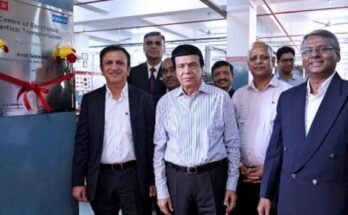Nand Ghars are a network of Modern Anganwadis designed to address the challenges faced by the network of 13.7 lakh Anganwadis in India. The Model reimagines the existing Anganwadi Network present
across the country and enhances the role of Anganwadi in the community.
Vedanta has signed a MoU with the Ministry of Women and Child Development to construct 4000 Nand
Ghars across India. Our Nand Ghar project is in line with Hon. Prime Minister’s flagship schemes: Swachh Bharat, Beti Bachao Beti Padhao and Start-up India by equipping Nand Ghars with televisions for e-learning, solar panels for reliable power, safe drinking water and clean toilets and empowering women by making them entrepreneurs.
Infrastructure
The state-of-art technology and infrastructure makes Nand Ghar a model resource centre for the community. Some of the key features are:
• Solar Panels: 24 x 7 electricity for essential facilities
• Clean Hygienic toilets: For healthy sanitation and inculcating behavioural changes
• Smart TV: E Learning of children
• Water Purifiers: Safe drinking water for Nand Ghar children and women
Operations
Once the Nand Ghars are open the infrastructure is being utilized in the morning time for children’s education and in the afternoon for skill development of women. The Nand Ghar centre daily provides:
• Pre-school education to children (3-6 years) through e-learning, BaLA designs and smart kits.
• Nutrition through hot cooked nutritious meals to children, pregnant and lactating women.
• Healthcare through Mobile Health Van and Tele-Health Services.
• Women empowerment through Skill, credit linkage and entrepreneurship development.
Nand Ghar Impact
Today ~2450 Nand Ghars are running across Rajasthan, Odisha, Uttar Pradesh, Jharkhand, Chhattisgarh,
Karnataka, Madhya Pradesh, Punjab, Himachal Pradesh, Assam, Gujarat, and Goa are a testimony to our
commitment of constructing 4000 Nand Ghars across India. The Impact is paving way for the model Anganwadi movement across the country.
• More than 90,000 children are being provided with pre-school learning through advanced teaching
learning methodologies including television, WhatsApp Groups and IVRS.
• 30,000 OPDs are being conducted per month by ten Nand Ghar Mobile Health Vans and Tele-Health
Services.
• More than 50,000 women have been trained and have started their own micro-enterprises or are supplementing their income through regular job work
Goal: Sustainable livelihood opportunities for women (>18 years) through Nand Ghar
Fundamentals
• Entrepreneurship development of women
• Provisioning job work to trained women
• Linking all women to government schemes and programmes
Target Group : Women above 18 years of age who are economically marginalised
Scope of Work
The programme will focus on entrepreneurship development and provisioning job work to women apart
from linking them to government schemes. Following matrix will provide the key activities and details of the same.
Activity Details
1. State wise Market Research
The Skill Partner will conduct market research (separate research for separate state) and identify the possible linkages available based on the geography. For example, carpet weaving, jewelry making, etc. in Jaipur (these are just examples, and the partner could look at other trades as well).
2. Identify Beneficiaries
The O & M Partner will mobilize the beneficiaries and support the skilling partner in forming the batches for each Nand Ghar. For Example, 30 women to be targeted per Nand Ghar
3. Linkage to prospective employers
Post the market research, identify prospective employers who can guarantee placement of trained beneficiaries in their organization. This would be part of the market research. We would expect 100% placement of women either in job work or entrepreneurship.
4. Trade Based skilling
The skilling partner will bring in expert trainers from identified organisations resulted from the market research. The beneficiaries will be trained (decided period of training) by the experts in the identified trades with an aim to employ them in the same organisations / provide job work. This training will yield placement / job work to 100% women who are trained. The training should ideally be provided by the organisations which eventually will employ / provide job work to these women.
5. Linkage to Government Schemes: The Skill Partner will ensure linkage of all beneficiaries to government schemes. For Example, Aadhaar Card, Ujjwala Yojana, MGNREGA, etc. 100% women who are part of the project will be provided with any one govt. scheme.
6. Ancillary Activities
Any interested women wanting to set up their business or become entrepreneurs, the Skill Partner will support in mobilizing the services including getting loans or microcredit.
7. Impact Assessment: Conduct a final study assessing the impact of the programme. Case studies to be part of the impact assessment report.
Important to Note
• Prospective organisations to submit the proposal based on 4000 Nand Ghars (160 Clusters of 25 Nand
Ghars each). These 4000 Nand Ghars would be spread across 15 states.
• Separate call outs would be given to the selected organisations from time to time based on the progress
of the project and progress of the construction and operationalisation of the Nand Ghars.
RFP submission Deadline: 29th September 2021.
For Terms of Reference, Click Here
For List of Document Required, Click Here
Connect with SKILL REPORTER on Facebook, Linkedin, Twitter, Telegram, Instagram to stay updated. You may also get your announcements published in SKILL REPORTER. To know more, write to us at info@skillreporter.com
Please email the proposal to Ms. Rakhi Chauhan at rakhi.chauhan@vedanta.co.in with a cc to Mr. Md Mohib at mohd.mohib@cairnindia.com / +91 8003997800



